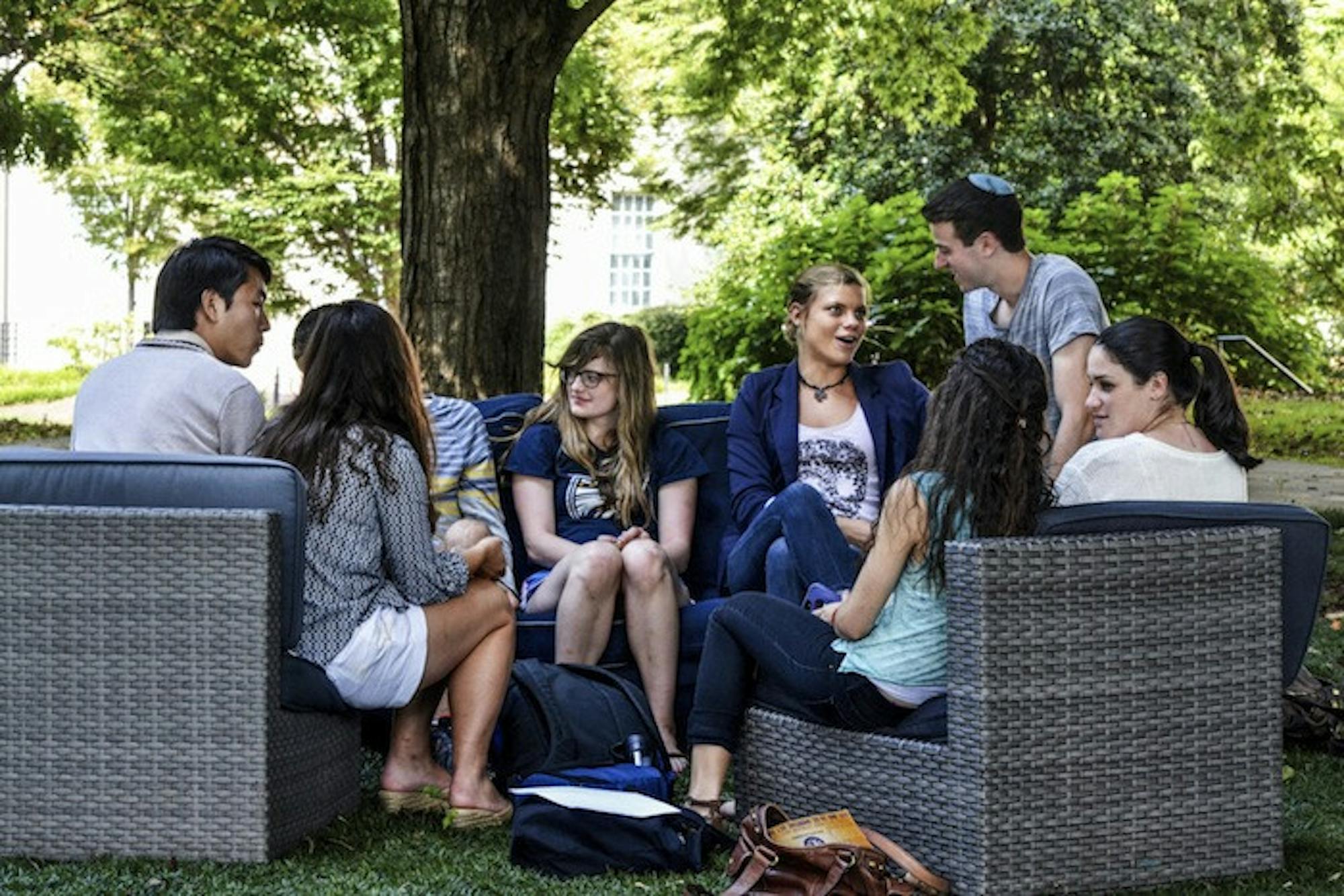
Students from different backgrounds sat on couches to engage in open dialogue as part of the new CampusCouches initiative./ Photo by Erin Baker, Staff Photographer
Couches arranged in a living room setting appeared on the Quadrangle, the freshman quad and Asbury Circle as a part of Campus Couches, an initiative organized by Emory College junior Ami Fields-Meyer and Goizueta Business School junior Adam Goldstein.
CampusCouches, inspired by the Free Convo Movement in New York City, took place on Tuesday afternoon and is part of TableTalk, a broader initiative developed by Fields-Meyer and Goldstein and funded by the Student Government Association (SGA) and Emory Campus Life on a case-by-case basis. Fields-Meyer explained that the goal of these initiatives is to take advantage of Emory's diversity and interact with a diverse range of students from different groups that you would not have interacted with otherwise. After sitting down on the Campus Couches, one is able to "converse with a diverse range of people who, like you, spontaneously sat down out of curiosity or out of desire to mingle with other people on the couches," Fields-Meyer said. CampusCouches, LookUp, which is funded by Emory Dining and encourages people to put their phones down before engaging in a conversation during a meal, and TableTalk, where two different organizations sit down to discuss different views, are all part of this initiative. "Emory students have a tendency to come to campus insular and remain in the groups that make them comfortable," Fields-Meyer said. "TableTalk runs three initiatives to ameliorate that and to tap into the thought laboratory we have at our fingertips." Fields-Meyer said that he felt there was a great success with CampusCouches. "We've had an overwhelmingly positive response, and often a sense of relief, manifested in something like 'I can't believe we've never done this before,'" Fields-Meyer said. "We just know more people from more parts of campus and more pockets of the world that we hadn't previously encountered." Goldstein said he was pleasantly surprised by the amount of people who were willing to hang out on the couches and talk to people that they did not know. "We don't often take time to sit and talk to people we don't know, not because we don't want to, but because no one gives us the excuse to do so," Goldstein said. Goldstein himself did not know anyone who sat on the couches on the freshman quad, but met many people who were interested in discussing their first-year experiences at Emory. College junior and TableTalk facilitator Will Russo also described what he thought were the successes of the initiatives. During the CampusCouches event, Russo noted that "people of different groups were able to make connections and talk about mutual friends during the event." For TableTalks, Fields-Meyer emphasized that its creation occurred in order to unify two unconnected groups or organizations. He also mentioned that TableTalk facilitators do not play a role in choosing which groups participate. Groups have the option to fill out a form that allows them to request another group to participate. Fields-Meyer said that the leaders of the groups or organizations meet with facilitators a week before the TableTalk to set the tone of the conversation and come up with good questions. The TableTalk website describes the facilitators as students "who are passionate leaders of various communities at Emory" and who help lead cross-cultural initiatives. During the actual TableTalk, the two groups engage in casual conversation about day-to-day interests such as music, hobbies, sports and families. After a shared meal, the leaders of the two groups discuss their identities as well as their group's missions. Then, each group has the opportunity to ask direct questions about identity to the other group. Fields-Meyer went on to explain: "[A TableTalk is] an opportunity to ask candid questions about identity to the only people who are really qualified to answer." The LookUp campaign encourages people to put their phones down before engaging in a conversation during a meal and is a pilot program in partnership with Emory Dining, according to Fields-Meyer. On Sept. 29, six tables at the Dobbs Market at the Dobbs University Center (DUC) will contain a box for people to put their phones in. Additionally, conversation prompts will be present at each table. Fields-Meyer said that for all initiatives, word is getting out through simple and effective marketing campaigns, and that Emory Dining's marketing team is also playing a role in promoting the LookUp campaign in the DUC. – By Avanti Patel, Contributing Writer




